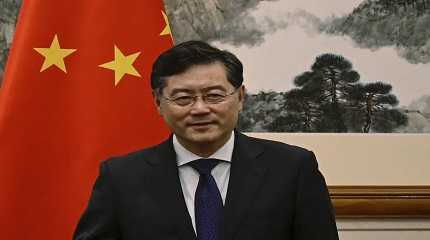
BEIJING, July 25 (Reuters) - China named veteran diplomat Wang Yi as its new foreign minister on Tuesday, removing former rising star Qin Gang after a mysterious one-month absence from duties barely half a year into the job.
Qin, 57, a former aide to President Xi Jinping and envoy to the US, took over the ministry in December but has not been seen in public since June 25 when he met visiting diplomats in Beijing.
The ministry has said he was off work for health reasons but given no detail, sparking speculation and drawing attention to the secrecy often surrounding China's Communist leadership and decision-making.
Qin's successor Wang, 69, was also his predecessor, holding the post from 2013-2022 as ties frayed with rival superpower the United States to a point Beijing described as an all-time low.
He has filled in for Qin during his absence and was this week representing China at a national security advisers' meeting of BRICS countries in Johannesburg, South Africa.
State media did not report why Qin was removed from office and China's foreign ministry did not respond to a request for comment.
"The lack of an explanation opens more questions than provides answers," said Ja Ian Chong, associate professor of political science at National University of Singapore.
"Developments surrounding Qin suggests that no one is indispensable. It also underscores the opacity and unpredictability, even arbitrariness in the current political system."
'AVOID EMBARRASSMENT'
Qin was one of China's youngest foreign ministers, enjoying a meteoric ascent that analysts partly attributed to his closeness to Xi. He was twice foreign ministry spokesman, between 2006-2014, and chief protocol officer from 2014-2018, overseeing many of Xi's contacts with foreign leaders.
He headed to Washington to take up the post of ambassador in July 2021, after a period of unusual public vitriol between U.S. and Chinese officials.
Wang, who served as foreign minister before Qin, was promoted to the politburo of the Chinese Communist Party, one of China's top leadership bodies.
He takes the foreign ministry post as China and the United States remain at odds over issues from Ukraine, Russia and Taiwan to trade and technology disputes.
"I think the main point here is China wants to avoid the embarrassment of continuously having Wang Yi appearing at these foreign minister level meetings without having the appropriate titles," said Wen-Ti Sung, a political scientist at the Australian National University.




